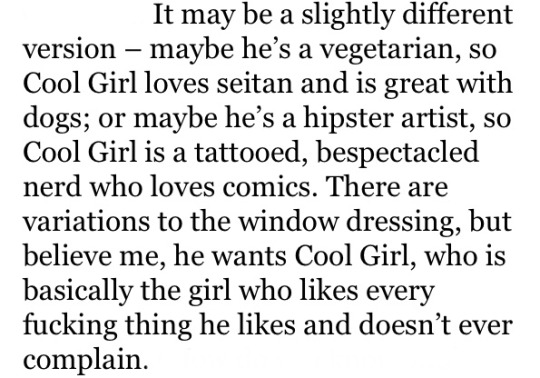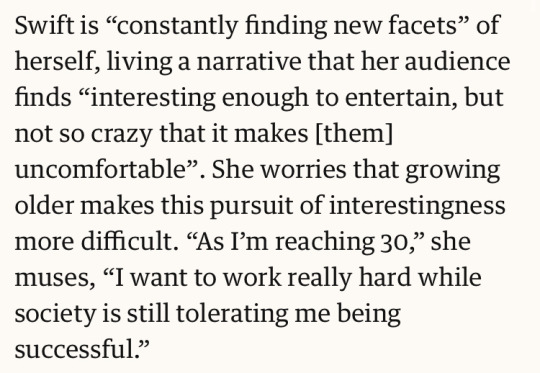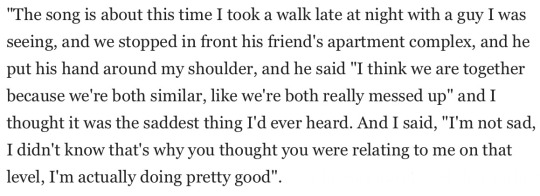#André Spicer
Text
The Coprophagic AI crisis

I'm on tour with my new, nationally bestselling novel The Bezzle! Catch me in TORONTO on Mar 22, then with LAURA POITRAS in NYC on Mar 24, then Anaheim, and more!

A key requirement for being a science fiction writer without losing your mind is the ability to distinguish between science fiction (futuristic thought experiments) and predictions. SF writers who lack this trait come to fancy themselves fortune-tellers who SEE! THE! FUTURE!
The thing is, sf writers cheat. We palm cards in order to set up pulp adventure stories that let us indulge our thought experiments. These palmed cards – say, faster-than-light drives or time-machines – are narrative devices, not scientifically grounded proposals.
Historically, the fact that some people – both writers and readers – couldn't tell the difference wasn't all that important, because people who fell prey to the sf-as-prophecy delusion didn't have the power to re-orient our society around their mistaken beliefs. But with the rise and rise of sf-obsessed tech billionaires who keep trying to invent the torment nexus, sf writers are starting to be more vocal about distinguishing between our made-up funny stories and predictions (AKA "cyberpunk is a warning, not a suggestion"):
https://www.antipope.org/charlie/blog-static/2023/11/dont-create-the-torment-nexus.html
In that spirit, I'd like to point to how one of sf's most frequently palmed cards has become a commonplace of the AI crowd. That sleight of hand is: "add enough compute and the computer will wake up." This is a shopworn cliche of sf, the idea that once a computer matches the human brain for "complexity" or "power" (or some other simple-seeming but profoundly nebulous metric), the computer will become conscious. Think of "Mike" in Heinlein's *The Moon Is a Harsh Mistress":
https://en.wikipedia.org/wiki/The_Moon_Is_a_Harsh_Mistress#Plot
For people inflating the current AI hype bubble, this idea that making the AI "more powerful" will correct its defects is key. Whenever an AI "hallucinates" in a way that seems to disqualify it from the high-value applications that justify the torrent of investment in the field, boosters say, "Sure, the AI isn't good enough…yet. But once we shovel an order of magnitude more training data into the hopper, we'll solve that, because (as everyone knows) making the computer 'more powerful' solves the AI problem":
https://locusmag.com/2023/12/commentary-cory-doctorow-what-kind-of-bubble-is-ai/
As the lawyers say, this "cites facts not in evidence." But let's stipulate that it's true for a moment. If all we need to make the AI better is more training data, is that something we can count on? Consider the problem of "botshit," Andre Spicer and co's very useful coinage describing "inaccurate or fabricated content" shat out at scale by AIs:
https://papers.ssrn.com/sol3/papers.cfm?abstract_id=4678265
"Botshit" was coined last December, but the internet is already drowning in it. Desperate people, confronted with an economy modeled on a high-speed game of musical chairs in which the opportunities for a decent livelihood grow ever scarcer, are being scammed into generating mountains of botshit in the hopes of securing the elusive "passive income":
https://pluralistic.net/2024/01/15/passive-income-brainworms/#four-hour-work-week
Botshit can be produced at a scale and velocity that beggars the imagination. Consider that Amazon has had to cap the number of self-published "books" an author can submit to a mere three books per day:
https://www.theguardian.com/books/2023/sep/20/amazon-restricts-authors-from-self-publishing-more-than-three-books-a-day-after-ai-concerns
As the web becomes an anaerobic lagoon for botshit, the quantum of human-generated "content" in any internet core sample is dwindling to homeopathic levels. Even sources considered to be nominally high-quality, from Cnet articles to legal briefs, are contaminated with botshit:
https://theconversation.com/ai-is-creating-fake-legal-cases-and-making-its-way-into-real-courtrooms-with-disastrous-results-225080
Ironically, AI companies are setting themselves up for this problem. Google and Microsoft's full-court press for "AI powered search" imagines a future for the web in which search-engines stop returning links to web-pages, and instead summarize their content. The question is, why the fuck would anyone write the web if the only "person" who can find what they write is an AI's crawler, which ingests the writing for its own training, but has no interest in steering readers to see what you've written? If AI search ever becomes a thing, the open web will become an AI CAFO and search crawlers will increasingly end up imbibing the contents of its manure lagoon.
This problem has been a long time coming. Just over a year ago, Jathan Sadowski coined the term "Habsburg AI" to describe a model trained on the output of another model:
https://twitter.com/jathansadowski/status/1625245803211272194
There's a certain intuitive case for this being a bad idea, akin to feeding cows a slurry made of the diseased brains of other cows:
https://www.cdc.gov/prions/bse/index.html
But "The Curse of Recursion: Training on Generated Data Makes Models Forget," a recent paper, goes beyond the ick factor of AI that is fed on botshit and delves into the mathematical consequences of AI coprophagia:
https://arxiv.org/abs/2305.17493
Co-author Ross Anderson summarizes the finding neatly: "using model-generated content in training causes irreversible defects":
https://www.lightbluetouchpaper.org/2023/06/06/will-gpt-models-choke-on-their-own-exhaust/
Which is all to say: even if you accept the mystical proposition that more training data "solves" the AI problems that constitute total unsuitability for high-value applications that justify the trillions in valuation analysts are touting, that training data is going to be ever-more elusive.
What's more, while the proposition that "more training data will linearly improve the quality of AI predictions" is a mere article of faith, "training an AI on the output of another AI makes it exponentially worse" is a matter of fact.

Name your price for 18 of my DRM-free ebooks and support the Electronic Frontier Foundation with the Humble Cory Doctorow Bundle.

If you'd like an essay-formatted version of this post to read or share, here's a link to it on pluralistic.net, my surveillance-free, ad-free, tracker-free blog:
https://pluralistic.net/2024/03/14/14/inhuman-centipede#enshittibottification

Image:
Plamenart (modified)
https://commons.wikimedia.org/wiki/File:Double_Mobius_Strip.JPG
CC BY-SA 4.0
https://creativecommons.org/licenses/by-sa/4.0/deed.en
#pluralistic#ai#generative ai#André Spicer#botshit#habsburg ai#jathan sadowski#ross anderson#inhuman centipede#science fiction#mysticism
549 notes
·
View notes
Link
For some reason, Elon Musk thinks that acting like a tyrant and treating workers like shit is good for business.
If you passed by the Twitter headquarters in San Francisco on Thursday, you would have seen a stream of insults projected on to the side of the building: “Elon Musk: mediocre manchild, pressurised privilege, petty racist, megalomaniac …” Inside, employees had received a message asking them to sign a pledge to work “long hours at high intensity” or leave their jobs. This came on the back of large-scale layoffs and an all-company email sent at 2.30am declaring “there is a good chance Twitter will not survive the upcoming economic downturn”.
Musk’s uncouth approach to managing people is long documented. Take allegations made about his behaviour at Tesla, where he reportedly yelled at one engineer “You’re a fucking idiot! … Get the fuck out and don’t come back!”, according to Wired. Other colleagues told the magazine that he would publicly humiliate and demote people, and that staff were discouraged from walking too near his desk as he was prone to “unpredictable rages”. “He was shouting that I didn’t know what I was doing, that I was an idiot, that he’s never worked with someone so incompetent,” one former employee told the magazine about her sacking.
Musk’s wrecking of Twitter will probably undermine public confidence in his other businesses. Would you buy a Tesla if you thought the company had the potential to implode like Twitter? Business longevity aside, there are ethical reasons not to support companies which treat employees like serfs in the Middle Ages.
The people who do remain at such companies despite having bosses who are raging assholes are a peculiar bunch.
Of course, many people do stick around despite a bad boss – and the reasons why they might stay don’t offer much hope for Musk and the future of Twitter.
Some people working under an abusive supervisor fall prey to what psychologists call “learned helplessness”. When people face difficult circumstances, they initially struggle to escape or fight back, but over time they start to treat the abuse as normal. They feel increasingly unable to change anything and become more and more passive. This means they miss opportunities to change, even when it possible.
Another reason people don’t leave bad bosses is they start to identify with them. This is a kind of workplace Stockholm syndrome whereby people begin looking up to their abusive bosses and even model themselves on them.
That sounds like a cult. Is Musk trying to keep only employees who aspire to be like him? That reminds me of mindless Trumpsters who unswervingly adore the Dear Leader even though his policies hurt them.
Ultimately the most creative and innovative people don’t crave to be managed by a Mini Putin. They will move on even if it means a temporary loss in income.
The pandemic has caused many people to think differently about their jobs. While many employers are adapting to change, others remain stubbornly mired in the old ways. In the case of Elon Musk, he’s moving backwards – to the 19th century of Charles Dickens novels.
11 notes
·
View notes
Text

Le Mime Phoenix!AU
Finally! I proper (? reference of André. My LeMime redesign for the Phoenix!AU. I've been postponing posting this because I was working on a comic to present him but that might take a while with my current schedule e_e So here's a pretty image of him for now!
He is Jack's right hand man and partner. He finally became a mage strong enough to earn his own mask (like Wuya got hers at some point of her training)- His magic is still based on silence but its way stronger now-
He also placed protective wards around his property so he and Jack can have some privacy from certain dragonlord.



#phoenix!au#le mime#xiaolin showdown#jack spicer#new art tag#André#duelo xiaolin#xs#lejack#JackMime#Jack Spicer x Le Mime#harpywitharobot
142 notes
·
View notes
Text
3 notes
·
View notes
Text
Beware the ‘botshit’: why generative AI is such a real and imminent threat to the way we live | André Spicer | The Guardian
5 notes
·
View notes
Text
Las 211 peliculas que he visto en 2022 (parte 2)
En negrita las que os recomiendo:
106. Azul oscuro casi negro (Daniel Sanchez Arevalo, 2006).
107. Destino Final 3 (James Wong, 2006)
108. El territorio de la bestia (Greg McLean, 2007)
109. Lake Mungo (Joel Anderson, 2008)
110. Las Ruinas (Carter Smith, 2008)
111. Los limoneros (Eran Riklis, 2008)
112. Superagente 86 de película (Peter Segal, 2008)
113. Petit Indi (Marc Recha, 2009)
114. Edificio España (Víctor Moreno, 2010)
115. El hombre sin pasado (Lee Jeong-beom, 2010)
116. Tron: Legacy (Joseph Kosinski, 2010)
117. Beyond the black rainbow (Panos Cosmatos, 2011)
118. La bicicleta verde (Haifaa al-Mansour, 2012)
119. The Bay (Barry Levinson, 2012)
120. Ahora me ves (Louis Leterrier, 2013)
121. El gran simulador (Nestor Frenkel, 2013)
122. The Borderlands (Elliot Goldner, 2013)
123. Frank (Lenny Abrahamson, 2014)
124. The Big Men (Rachel Boynton, 2014)
125. The Guest (Adam Wingard, 2014)
126. Caza al asesino (Pierre Morel, 2015)
127. El despertar de los dragones (Soi Cheang, 2015)
128. La juventud (Paolo Sorrentino, 2015)
129. Perdiendo el Norte (Nacho G Velilla, 2015).
130. Una pastelería en Tokio (Naomi Kawase, 2015)
131. Ahora me ves 2 (Jon M. Chu, 2016)
132. Cien años de perdón (Daniel Calparsoro, 2016)
133. Doña Clara (Aquarius) (Kleber Mendonça Filho, 2016)
134. El Caso Sloane (John Madden, 2016)
135. El Vacio (Jeremy Gillespie y Steven Kostanski, 2016)
136. La autopsia de Jane Doe (André Øvredal, 2016)
137. Paterson (Jim Jarmusch, 2016)
138. Reina de Katwe (Mira Nair, 2016)
139. The eyes of my mother (Nicolas Pesce, 2016)
140. Un italiano en Noruega (Gennaro Nunziante, 2016)
141. Ingrid Goes West (Matt Spicer, 2017)
142. Lady Bird (Greta Gerwig, 2017)
143. Tierra Firme (Carlos Marques-Marcet, 2017)
147. Verónica (Paco Plaza, 2017)
148. Default (Kook-Hee Choi, 2018)
149. El ombligo de Guie’dani (Xavi Sala, 2018)
150. Searching... (Aneesh Chaganty, 2018)
152. Silvio (y los otros) (Paolo Sorrentino, 2018).
153. Un pequeño favor (Paul Feig, 2018)
154. Upgrade (Leigh Whannell, 2018)
155. Así crecen los enanos (Raul Serrano, 2019)
156. Bliss (Joe Begos, 2019)
157. Brittany corre un maratón (Paul Downs Colaizzo, 2019)
158. Contagio en alta mar (Neasa Hardiman, 2019)
159. El bosque maldito (Lee Cronin, 2019)
160. First cow (Kelly Reichardt, 2019).
161. La cabaña siniestra (Veronika Franz y Severin Fiala, 2019)
162. La democracia en peligro (Petra Costa, 2019)
163. Los días que vendrán (Carlos Marques-Marcet, 2019)
164. Nación cautiva (Josh Wyatt, 2019)
165. Quien a hierro mata (Paco Plaza, 2019)
166. The Beach House (Jeffrey A Brown, 2019)
167. Vivarium (Lorcan Finnegan, 2019)
168. Aves de presa y la fantabulosa emancipación de Harley Quinn (Cathy Yan, 2020)
169. Casa Ajena (Remi Weekes, 2020)
170. Come true (Anthony Scott Burns, 2020)
171. El capital humano (Marc Meyers, 2020)
172. El hombre invisible (Leigh Whannell, 2020)
173. Hillbilly, una elegia rural (Ron Howard, 2020)
174. La boda de Rosa (Iciar Bollain, 2020)
175. Mandíbulas (Quentin Dupieux, 2020)
176. Mas allá de los dos minutos infinitos (Junta Yamaguchi, 2020)
177. Minari. Historia de mi familia (Lee Isaac Chung, 2020)
178. Murder Death Koreatown (anonimo, 2020)
179. Sputnik (Egor Abramenko, 2020)
180. Tenet (Christopher Nolan, 2020)
181. Underwater (William Eubank, 2020)
182. Un lugar tranquilo 2 (John Krasinski, 2020)
183. Black Widow (Cate Shortland, 2021)
184. Chavalas (Carol Rodríguez Colás, 2021)
185. El buen patrón (Fernando Leon de Aranoa, 2021)
186. Freaks Out (Gabrielle Mainetti, 2021)
187. Gaia (Jaco Bouwer, 2021)
188. Hombres lobo entre nosotros (Josh Ruben, 2021)
189. In the Earth (Ben Weathley, 2021)
190. Kate (Cedric Nicolas-Troyan, 2021)
191. La abuela (Paco Plaza, 2021).
192. La peor persona del mundo (Joachim Trier, 2021)
193. Los voyeurs (Michael Mohan, 2021)
194. No mires arriba (Adam McKay, 2021).
195. One Shot: Mision de Rescate (James Nunn, 2021)
196. Paris, distrito 13 (Jacques Audiard, 2021)
197. Petit Maman (Céline Sciamma, 2021)
198. Sin tiempo para morir (Cary Joji Fukunaga, 2021)
199. Spencer (Pablo Larrain, 2021).
200. Spiderman: No way home (Jon Watts, 2021)
201. Titane (Julia Ducornau, 2021).
202. Ultima noche en el Soho (Edgar Wright, 2021)
203. Un héroe (Asghar Farhadi, 2021)
204. Woodlands Dark and Days Bewitched (Kier-La Janisse, 2021)
205. Alcarras (Carla Simón, 2022)
206. Bullet Train (David Leitch, 2022)
207. El agua (Elena López Riera, 2022)
208. Kimi (Steven Soderbergh, 2022)
209. Minions: El origen de Gru (Kyle Balda, 2022)
210. Thor: Love & Thunder (Taika Waititi, 2022)
211. Todo a la vez en todas partes (Dan Kwan y Daniel Scheinert, 2022)
3 notes
·
View notes
Note
21 and 73 in wrapped?
youtube
#21 Too Much Space - Kurt Travis (ft. Andrés)
Something about this song makes it either hit Just Right or feel Too Whiny, depending on my mood! This is also on my Frank Spicer playlist <3
youtube
#73 SAD (Clap Your Hands) - Young Rising Sons
I can't find what playlist of mine this is from, but I KNOW I've heard it a million times.
3 notes
·
View notes
Quote
With the rise of generative AI and technologies such as ChatGPT, we could see the rise of a phenomenon my colleagues and I label “botshit”.
Beware the ‘botshit’: why generative AI is such a real and imminent threat to the way we live | André Spicer
0 notes
Text
0 notes
Text
Companies With ‘Flat’ Structures Rarely Work. Is There a Solution?
But do flat structures work? André Spicer, a professor of organizational behavior at the Bayes Business School in London, said that, while the “cultural zeitgeist when I was growing up was that hierarchies are bad,” there’s been an increasing recognition of both the need for them and the fact that they often reappear in businesses that, at least theoretically, reject them. “People aren’t just…
View On WordPress
0 notes
Link
Do you get the creeping dread at the end of the weekend? It’s time to build some healthy boundariesA few years ago, I was in the kitchen of a friend’s house preparing for a meal. When we sat down...
0 notes
Text










1. mirrorball, taylor swift // 3, 7. ‘taylor swift's documentary shows why we should stop trying to be ‘interesting,’’ andré spicer // 4. gone girl, gillian flynn // 5. narcissus (1597-99), caravaggio // 6. all too well (10 minute version), taylor swift // 8. mariners apartment complex, lana del rey // 9. ‘lana del rey hottest record, radio 1’s future sounds with annie mac’ (sept. 12, 2018), bbc radio 1 // 10. ig @almart_8
~ “i can change everything about me to fit in”
#web weaving#parallels#connections#lyrics#quotes#art#books#words#visual diary#visual art#mirrorball#taylor swift#folklore#swifties#swiftblr#cool girl#gone girl#gillian flynn#all too well#all too well 10 min version#taylor’s version#mariners apartment complex#lana del rey#feminist thought#radical feminism#radblr#feminist theory#feminism#collage#collage art
304 notes
·
View notes
Text
[R]ecent work on changes in the running of states suggests that autonomy has become increasingly incorporated into policy. On many occasions, autonomy movements deliver what were previously state services and ensure the governance of a population. For example, in Latin America the community work of autonomist movements sometimes replaces municipal functions. Similarly, in Great Britain and North America the restructuring of the neoliberal state has relied on a shift in the provision of services from the state to either the private or non-profit sectors. One result of this shift has been that what were once radical social movements often become bodies that deliver services for the state.
Getting social movement organizations to fill in institutional voids left by the shrinking state has been represented in glowing terms by many governments. For example, New Labour in the UK has celebrated the expansion of social movement organizations providing various services as a step towards an engaged and active civil society, community empowerment and also autonomy. Indeed, increasing autonomy of both individuals and communities has become a central plank in much “third way” policy making in recent years.
Steffen Böhm, Ana C. Dinerstein and André Spicer, “(Im)possibilities of Autonomy: Social Movements in and Beyond Capital, the State and Development,” Social Movement Studies 9.1 (2010), p. 25.
0 notes
Text
On Bosslessness
André Spicer debunks the utopian ideal of bosslessness, saying that companies like Valve and others that have theoretically dispensed with a hierarchy and the notion of 'working for' other people are actually operating on undefined and hidden power structures. His piece seems largely based on comments of former, disgruntled employees:
In 2012 Valve's new employee handbook was leaked. Fawning articles about this unique and amazing company appear everywhere from the BBC to Harvard Business Review. Valve's economist in residence -- Yanis Varoufakis, the former Greek finance minister -- appeared on a podcast describing the company's unique system of rewarding employees.
Since then, the glittering aura of Valve's "no boss" culture has started to fade. In 2013, an ex-employee described how the company had "a pseudo-flat structure". "There is actually a hidden layer of powerful management structure in the company," she said, which made it feel "a lot like high school".
Now, five years later, another ex-employee has taken to Twitter to share his thoughts about a nameless company that closely resembles Valve. Rich Geldreich described how the firm would hire employees, make them grand promises, then fire them once they were no longer useful. He described the firm as being run by "barons" -- and advises new employees to cosy up to a baron in order to "rapidly up your purge immunity level before the next firing cycle".
Geldreich's description squares with some reviews of Valve on Glassdoor, a site where staff leave anonymous verdicts on their employers (although it has to be said that many employees like Valve's culture). One describes the no-boss culture as "only a facade": "To succeed at Valve you need to belong to the group that has more decisional power and, even when you succeed temporarily, be certain that you have an expiration date. No matter how hard you work, no matter how original and productive you are, if your bosses and the people who count don't like you, you will be fired soon or you will be managed out."
Geldreich describes a neo-feudal workplace culture of powerful barons who ruthlessly exercise their whims over temporary favourites, then turn on them during the next "head count reduction" exercise.
I believe that you can't move to a new way of work by simply saying 'there are no bosses' and expect some magical transformation to happen. In fact, changing from a conventional top-down command-and-control organization to something else, based on new principles, involves both a fairly good idea of what the something else is to be, and a plan for taking the organization from A to B.
I am in the process of researching the profound changes that have gone on at Haier, the world's largest appliance maker, and it will serve as a strong case study supporting my view. In fact, I have recently returned from a trip to Qingdao where I met with many people across Haier, including Zhang Riumin, the CEO and Chairman. About that, more to follow.
0 notes
Text
Hugo Marchand © James Bort
The Ravenna Festival was founded in 1990 by Cristina Mazzavillani Muti, with a rich programme which includes symphonic and chamber music, opera, drama, dance, ballet, musical theatre, jazz, and ethnic music.
It’s the perfect location for a summer festival as Ravenna is a stunningly beautiful city, with eight UNESCO World Heritage sites including its stunning gilded basilicas encrusted with the famous ancient mosaics, and also because it only takes only quarter of an hour to drive to the beaches and pine forest.
Opening the festival on 5 June this year was Mazzavillani’s husband, Riccardo Muti, conducting the Orchestra Giovanile Luigi Cherubini with Maurizio Pollini, and closing it on 16 July is Daniele Cipriani’s Les Étoiles gala: a mosaic of dance in the city of mosaics.
The dancers come from Korea, France, Italy, Kazakhstan, Russia, Spain, America representing ballet companies also in Hungary and Holland:
Dorothée Gilbert and Hugo Marchand (Paris Opera Ballet)
Jacopo Tissi and Alena Kovaleva (Bolshoi Ballet)
Bakhtiyar Adamzhan (Astana Opera, Kazakhstan)
Tatiana Melnik (Hungarian National Ballet)
Constantine Allen, Anna Tsygankova, Young Gyu Choi and Rebecca Storani (Dutch National Ballet)
Sergio Bernal (Spanish National Ballet)
Les Étoiles
16 July 2019 at 21.30 at the Palazzo Mauro de André
Sergio Bernal, The Swan, Les Etoiles 2019 © Malcolm Levinkind
Jacopo Tissi and Alena Kovaleva © Cristiano Castaldi
Constantine Allen
Anna Tsygankova with Jozef Varga in Swan Lake © Graham Spicer
Programme: Les Étoiles, Ravenna 2019
FIRST PART
Diamonds (from “Jewels”)
©The George Balanchine Trust
Choreography George Balanchine
Music Pyotr Ilyich Tchaikovsky
with Alena Kovaleva and Jacopo Tissi
Esmeralda
Choreography Marius Petipa (from Jules Perrot)
Music Cesare Pugni
with Dorothée Gilbert and Hugo Marchand
Flames of Paris (pas de deux)
Choreography Vasili Vainonen
Music Boris Asafyev
with Rebecca Storani and Young Gyu Choi
Le Corsaire (pas de deux Act II)
Choreography Marius Petipa
Music Riccardo Drigo
with Tatiana Melnik and Bakhtiyar Adamzhan
Zapateado de Sarasate
Choreography Antonio Ruiz Soler
Music Pablo de Sarasate
with Sergio Bernal
Swan Lake (Black Swan pas de deux, Act III)
Choreography Marius Petipa
Music Pyotr Ilyich Tchaikovsky
with Anna Tsygankova and Constantine Allen
INTERVAL
Anna Tsygankova with Jozef Varga in Duet © Graham Spicer
Dorothée Gilbert
Bakhtiyar Adamzhan and Tatiana Melnik in Diana and Actaeon, Les Etoiles 2019 © Malcolm Levinkind
Young Gyu Choi © Altin Kaftira
SECOND PART
The Swan
Choreography Ricardo Cue
Music Camille Saint-Saëns
with Sergio Bernal
Amovéo
Choreography Benjamin Millepied
Music Philip Glass
Costumes Benjamin Millepied and Paul Cox
with Dorothée Gilbert and Hugo Marchand
Diana and Actaeon (pas de deux)
Choreography Agrippina Vaganova
Music Riccardo Drigo
with Rebecca Storani and Young Gyu Choi
Duet
Choreography Christopher Wheeldon
Music Maurice Ravel
with Anna Tsygankova and Constantine Allen
Grand Pas Classique
Choreography Victor Gsovsky
Music Daniel Auber
with Alena Kovaleva and Jacopo Tissi
Don Quixote (pas de deux, Act III)
Choreography Marius Petipa
Music Ludwig Minkus
with Tatiana Melnik and Bakhtiyar Adamzhan
Défilé
Music Riccardo Drigo
Les Étoiles dance gala closes the 2019 Ravenna Festival The Ravenna Festival was founded in 1990 by Cristina Mazzavillani Muti, with a rich programme which includes symphonic and chamber music, opera, drama, dance, ballet, musical theatre, jazz, and ethnic music.
#Benjamin Millepied#Christopher Wheeldon#Daniele Cipriani#George Balanchine#Jacopo Tissi#Marius Petipa#Sergio Bernal
1 note
·
View note